Evaluating TESCO's Failure: Cultural, Regulatory, and Other Forces
VerifiedAdded on 2023/06/17
|12
|3737
|251
Report
AI Summary
This report examines the failure of TESCO in the Chinese market, attributing it to a combination of cultural differences and regulatory challenges. The analysis highlights how TESCO's inability to adapt to Chinese consumer preferences and navigate the institutional and regulatory framework contributed to its downfall. Cultural differences are explored through Hofstede's model, revealing disparities in power distance, individualism, uncertainty avoidance, and long-term orientation between the UK and China. The report also discusses the impact of China's regulatory and institutional policies, including trade barriers and corporate governance, on TESCO's business expansion strategy. Furthermore, it acknowledges the role of competition, particularly from RT-Mart, and other market-specific factors in TESCO's failure. The report concludes that a comprehensive understanding of cultural nuances, regulatory environments, and competitive landscapes is crucial for multinational companies venturing into new markets. Desklib provides a platform for students to access similar solved assignments and past papers for further study.
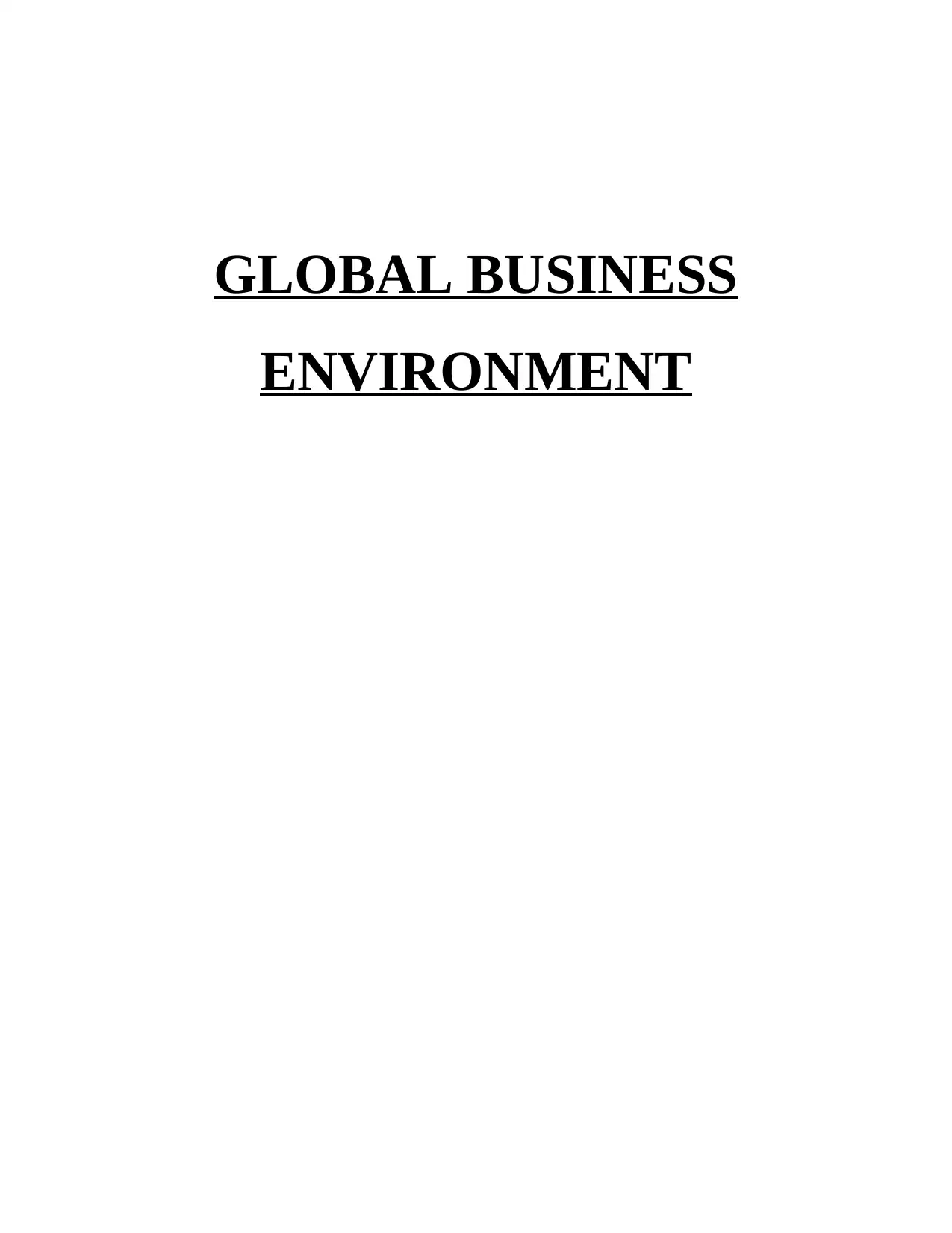
GLOBAL BUSINESS
ENVIRONMENT
ENVIRONMENT
Paraphrase This Document
Need a fresh take? Get an instant paraphrase of this document with our AI Paraphraser
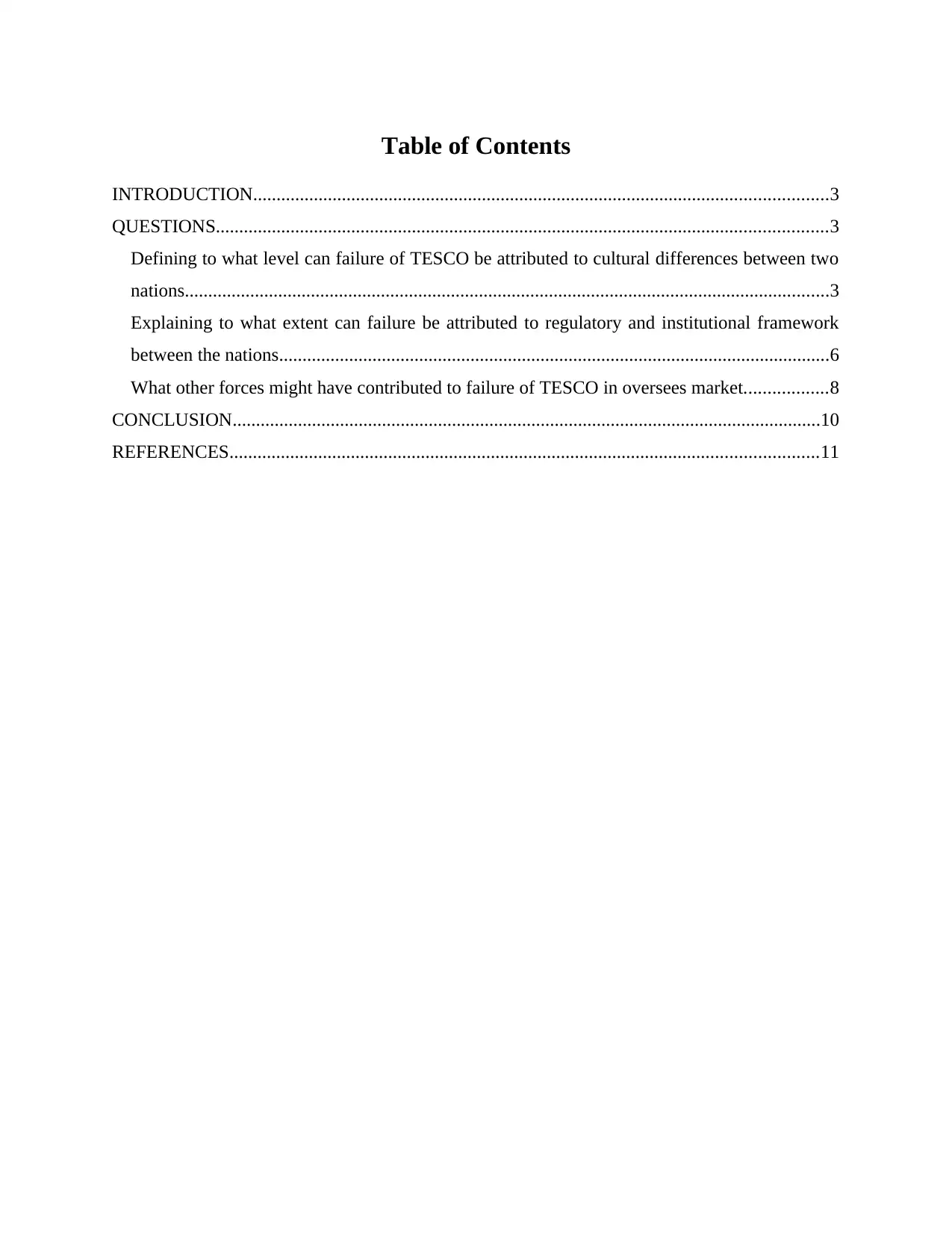
Table of Contents
INTRODUCTION...........................................................................................................................3
QUESTIONS...................................................................................................................................3
Defining to what level can failure of TESCO be attributed to cultural differences between two
nations..........................................................................................................................................3
Explaining to what extent can failure be attributed to regulatory and institutional framework
between the nations......................................................................................................................6
What other forces might have contributed to failure of TESCO in oversees market..................8
CONCLUSION..............................................................................................................................10
REFERENCES..............................................................................................................................11
INTRODUCTION...........................................................................................................................3
QUESTIONS...................................................................................................................................3
Defining to what level can failure of TESCO be attributed to cultural differences between two
nations..........................................................................................................................................3
Explaining to what extent can failure be attributed to regulatory and institutional framework
between the nations......................................................................................................................6
What other forces might have contributed to failure of TESCO in oversees market..................8
CONCLUSION..............................................................................................................................10
REFERENCES..............................................................................................................................11
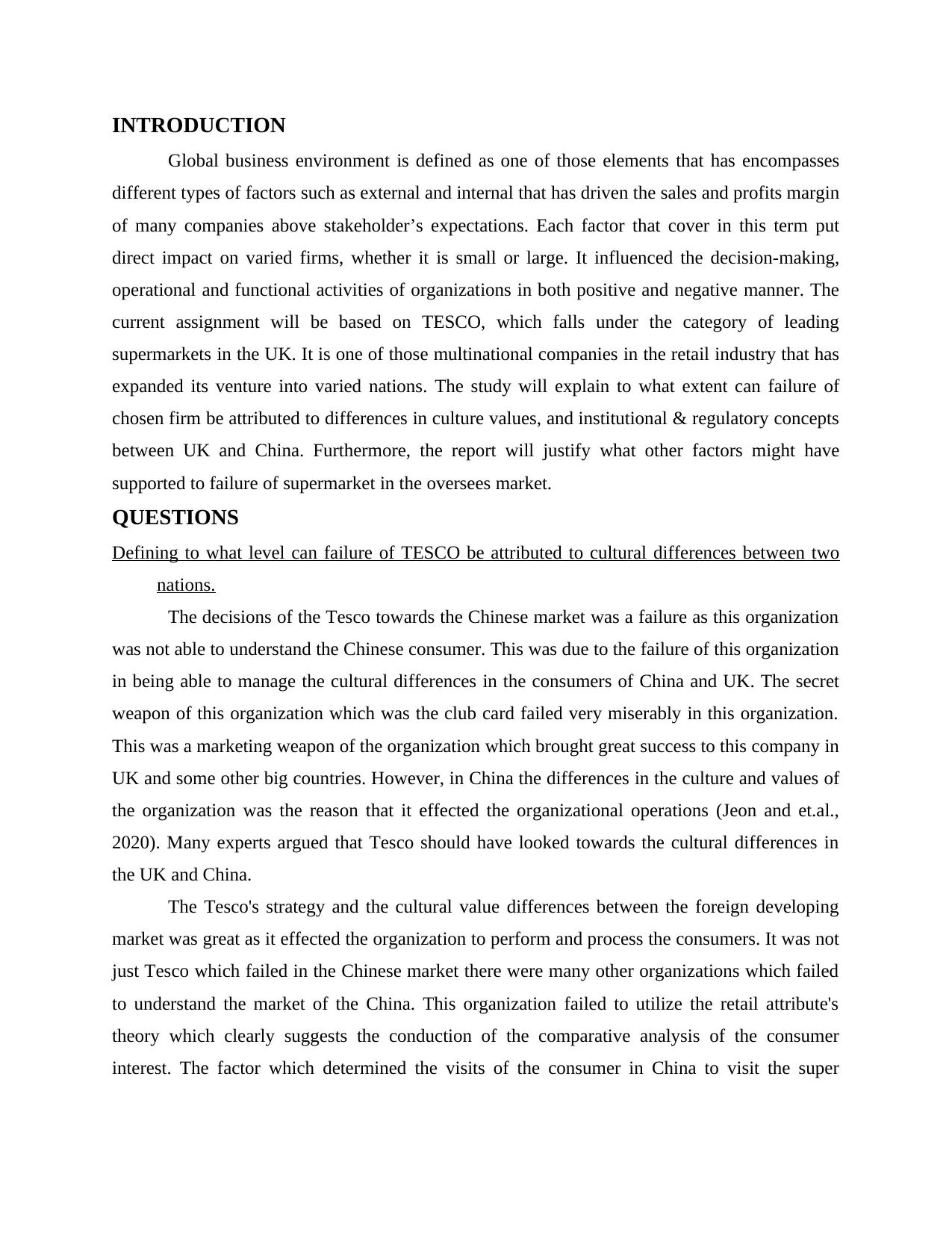
INTRODUCTION
Global business environment is defined as one of those elements that has encompasses
different types of factors such as external and internal that has driven the sales and profits margin
of many companies above stakeholder’s expectations. Each factor that cover in this term put
direct impact on varied firms, whether it is small or large. It influenced the decision-making,
operational and functional activities of organizations in both positive and negative manner. The
current assignment will be based on TESCO, which falls under the category of leading
supermarkets in the UK. It is one of those multinational companies in the retail industry that has
expanded its venture into varied nations. The study will explain to what extent can failure of
chosen firm be attributed to differences in culture values, and institutional & regulatory concepts
between UK and China. Furthermore, the report will justify what other factors might have
supported to failure of supermarket in the oversees market.
QUESTIONS
Defining to what level can failure of TESCO be attributed to cultural differences between two
nations.
The decisions of the Tesco towards the Chinese market was a failure as this organization
was not able to understand the Chinese consumer. This was due to the failure of this organization
in being able to manage the cultural differences in the consumers of China and UK. The secret
weapon of this organization which was the club card failed very miserably in this organization.
This was a marketing weapon of the organization which brought great success to this company in
UK and some other big countries. However, in China the differences in the culture and values of
the organization was the reason that it effected the organizational operations (Jeon and et.al.,
2020). Many experts argued that Tesco should have looked towards the cultural differences in
the UK and China.
The Tesco's strategy and the cultural value differences between the foreign developing
market was great as it effected the organization to perform and process the consumers. It was not
just Tesco which failed in the Chinese market there were many other organizations which failed
to understand the market of the China. This organization failed to utilize the retail attribute's
theory which clearly suggests the conduction of the comparative analysis of the consumer
interest. The factor which determined the visits of the consumer in China to visit the super
Global business environment is defined as one of those elements that has encompasses
different types of factors such as external and internal that has driven the sales and profits margin
of many companies above stakeholder’s expectations. Each factor that cover in this term put
direct impact on varied firms, whether it is small or large. It influenced the decision-making,
operational and functional activities of organizations in both positive and negative manner. The
current assignment will be based on TESCO, which falls under the category of leading
supermarkets in the UK. It is one of those multinational companies in the retail industry that has
expanded its venture into varied nations. The study will explain to what extent can failure of
chosen firm be attributed to differences in culture values, and institutional & regulatory concepts
between UK and China. Furthermore, the report will justify what other factors might have
supported to failure of supermarket in the oversees market.
QUESTIONS
Defining to what level can failure of TESCO be attributed to cultural differences between two
nations.
The decisions of the Tesco towards the Chinese market was a failure as this organization
was not able to understand the Chinese consumer. This was due to the failure of this organization
in being able to manage the cultural differences in the consumers of China and UK. The secret
weapon of this organization which was the club card failed very miserably in this organization.
This was a marketing weapon of the organization which brought great success to this company in
UK and some other big countries. However, in China the differences in the culture and values of
the organization was the reason that it effected the organizational operations (Jeon and et.al.,
2020). Many experts argued that Tesco should have looked towards the cultural differences in
the UK and China.
The Tesco's strategy and the cultural value differences between the foreign developing
market was great as it effected the organization to perform and process the consumers. It was not
just Tesco which failed in the Chinese market there were many other organizations which failed
to understand the market of the China. This organization failed to utilize the retail attribute's
theory which clearly suggests the conduction of the comparative analysis of the consumer
interest. The factor which determined the visits of the consumer in China to visit the super
⊘ This is a preview!⊘
Do you want full access?
Subscribe today to unlock all pages.

Trusted by 1+ million students worldwide
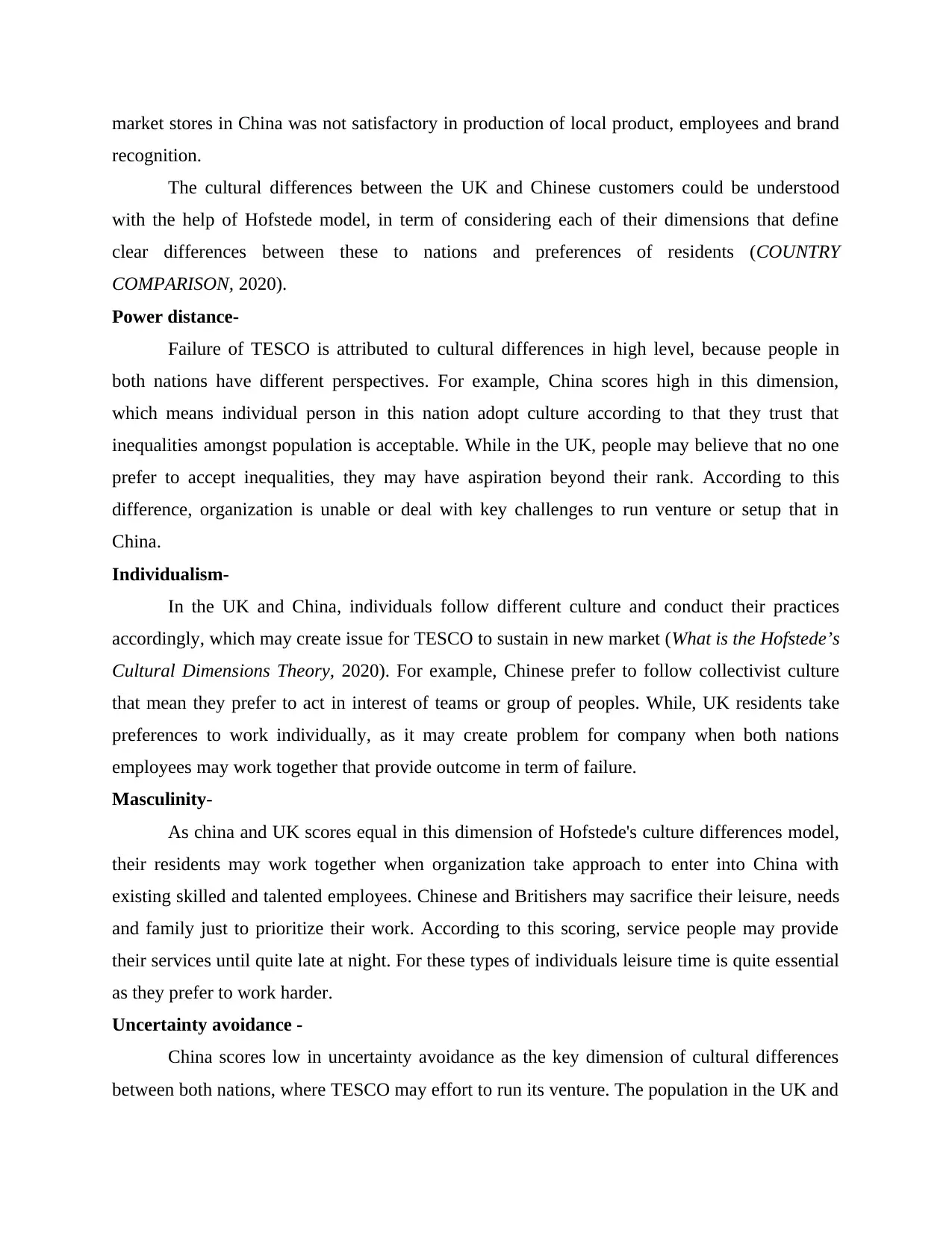
market stores in China was not satisfactory in production of local product, employees and brand
recognition.
The cultural differences between the UK and Chinese customers could be understood
with the help of Hofstede model, in term of considering each of their dimensions that define
clear differences between these to nations and preferences of residents (COUNTRY
COMPARISON, 2020).
Power distance-
Failure of TESCO is attributed to cultural differences in high level, because people in
both nations have different perspectives. For example, China scores high in this dimension,
which means individual person in this nation adopt culture according to that they trust that
inequalities amongst population is acceptable. While in the UK, people may believe that no one
prefer to accept inequalities, they may have aspiration beyond their rank. According to this
difference, organization is unable or deal with key challenges to run venture or setup that in
China.
Individualism-
In the UK and China, individuals follow different culture and conduct their practices
accordingly, which may create issue for TESCO to sustain in new market (What is the Hofstede’s
Cultural Dimensions Theory, 2020). For example, Chinese prefer to follow collectivist culture
that mean they prefer to act in interest of teams or group of peoples. While, UK residents take
preferences to work individually, as it may create problem for company when both nations
employees may work together that provide outcome in term of failure.
Masculinity-
As china and UK scores equal in this dimension of Hofstede's culture differences model,
their residents may work together when organization take approach to enter into China with
existing skilled and talented employees. Chinese and Britishers may sacrifice their leisure, needs
and family just to prioritize their work. According to this scoring, service people may provide
their services until quite late at night. For these types of individuals leisure time is quite essential
as they prefer to work harder.
Uncertainty avoidance -
China scores low in uncertainty avoidance as the key dimension of cultural differences
between both nations, where TESCO may effort to run its venture. The population in the UK and
recognition.
The cultural differences between the UK and Chinese customers could be understood
with the help of Hofstede model, in term of considering each of their dimensions that define
clear differences between these to nations and preferences of residents (COUNTRY
COMPARISON, 2020).
Power distance-
Failure of TESCO is attributed to cultural differences in high level, because people in
both nations have different perspectives. For example, China scores high in this dimension,
which means individual person in this nation adopt culture according to that they trust that
inequalities amongst population is acceptable. While in the UK, people may believe that no one
prefer to accept inequalities, they may have aspiration beyond their rank. According to this
difference, organization is unable or deal with key challenges to run venture or setup that in
China.
Individualism-
In the UK and China, individuals follow different culture and conduct their practices
accordingly, which may create issue for TESCO to sustain in new market (What is the Hofstede’s
Cultural Dimensions Theory, 2020). For example, Chinese prefer to follow collectivist culture
that mean they prefer to act in interest of teams or group of peoples. While, UK residents take
preferences to work individually, as it may create problem for company when both nations
employees may work together that provide outcome in term of failure.
Masculinity-
As china and UK scores equal in this dimension of Hofstede's culture differences model,
their residents may work together when organization take approach to enter into China with
existing skilled and talented employees. Chinese and Britishers may sacrifice their leisure, needs
and family just to prioritize their work. According to this scoring, service people may provide
their services until quite late at night. For these types of individuals leisure time is quite essential
as they prefer to work harder.
Uncertainty avoidance -
China scores low in uncertainty avoidance as the key dimension of cultural differences
between both nations, where TESCO may effort to run its venture. The population in the UK and
Paraphrase This Document
Need a fresh take? Get an instant paraphrase of this document with our AI Paraphraser
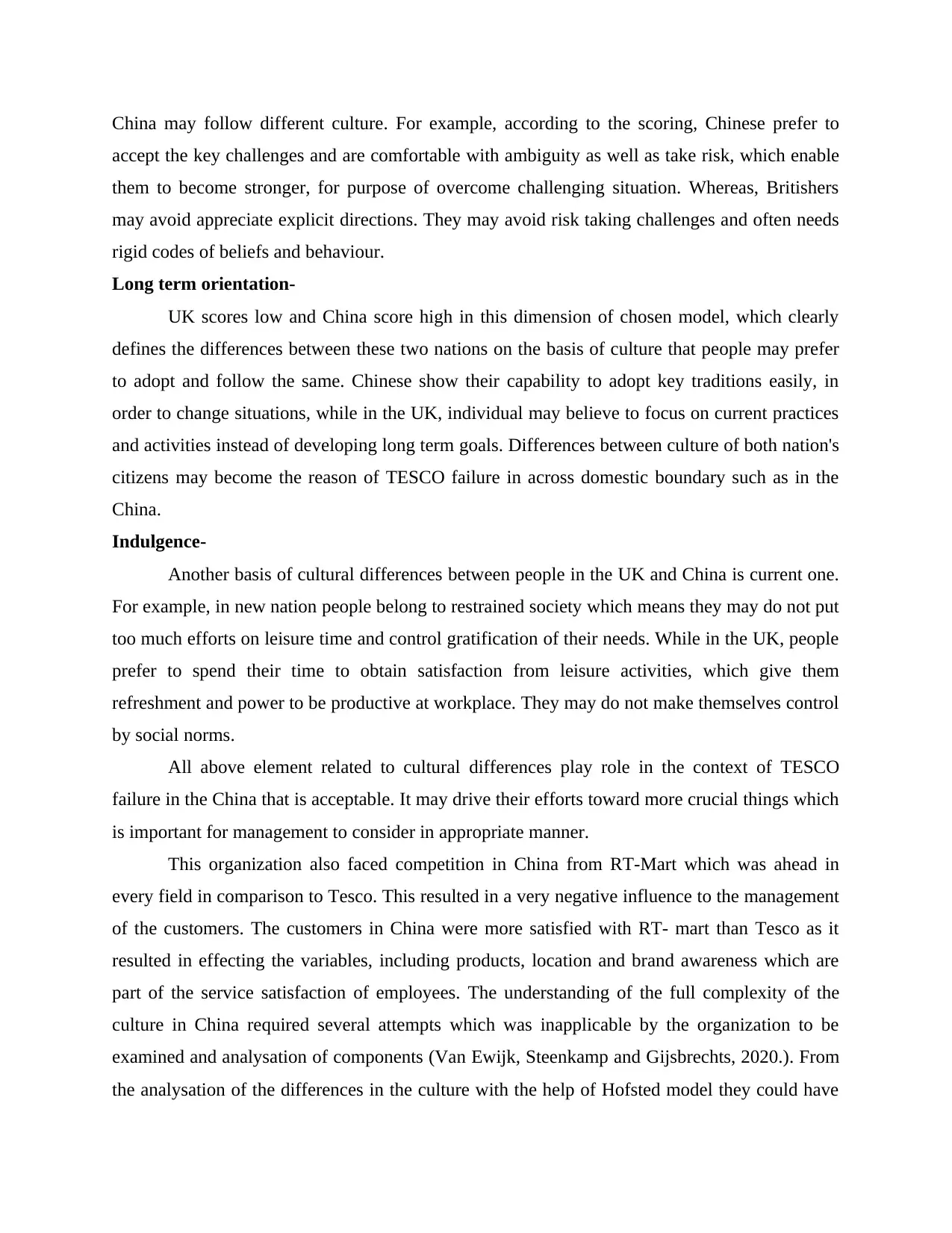
China may follow different culture. For example, according to the scoring, Chinese prefer to
accept the key challenges and are comfortable with ambiguity as well as take risk, which enable
them to become stronger, for purpose of overcome challenging situation. Whereas, Britishers
may avoid appreciate explicit directions. They may avoid risk taking challenges and often needs
rigid codes of beliefs and behaviour.
Long term orientation-
UK scores low and China score high in this dimension of chosen model, which clearly
defines the differences between these two nations on the basis of culture that people may prefer
to adopt and follow the same. Chinese show their capability to adopt key traditions easily, in
order to change situations, while in the UK, individual may believe to focus on current practices
and activities instead of developing long term goals. Differences between culture of both nation's
citizens may become the reason of TESCO failure in across domestic boundary such as in the
China.
Indulgence-
Another basis of cultural differences between people in the UK and China is current one.
For example, in new nation people belong to restrained society which means they may do not put
too much efforts on leisure time and control gratification of their needs. While in the UK, people
prefer to spend their time to obtain satisfaction from leisure activities, which give them
refreshment and power to be productive at workplace. They may do not make themselves control
by social norms.
All above element related to cultural differences play role in the context of TESCO
failure in the China that is acceptable. It may drive their efforts toward more crucial things which
is important for management to consider in appropriate manner.
This organization also faced competition in China from RT-Mart which was ahead in
every field in comparison to Tesco. This resulted in a very negative influence to the management
of the customers. The customers in China were more satisfied with RT- mart than Tesco as it
resulted in effecting the variables, including products, location and brand awareness which are
part of the service satisfaction of employees. The understanding of the full complexity of the
culture in China required several attempts which was inapplicable by the organization to be
examined and analysation of components (Van Ewijk, Steenkamp and Gijsbrechts, 2020.). From
the analysation of the differences in the culture with the help of Hofsted model they could have
accept the key challenges and are comfortable with ambiguity as well as take risk, which enable
them to become stronger, for purpose of overcome challenging situation. Whereas, Britishers
may avoid appreciate explicit directions. They may avoid risk taking challenges and often needs
rigid codes of beliefs and behaviour.
Long term orientation-
UK scores low and China score high in this dimension of chosen model, which clearly
defines the differences between these two nations on the basis of culture that people may prefer
to adopt and follow the same. Chinese show their capability to adopt key traditions easily, in
order to change situations, while in the UK, individual may believe to focus on current practices
and activities instead of developing long term goals. Differences between culture of both nation's
citizens may become the reason of TESCO failure in across domestic boundary such as in the
China.
Indulgence-
Another basis of cultural differences between people in the UK and China is current one.
For example, in new nation people belong to restrained society which means they may do not put
too much efforts on leisure time and control gratification of their needs. While in the UK, people
prefer to spend their time to obtain satisfaction from leisure activities, which give them
refreshment and power to be productive at workplace. They may do not make themselves control
by social norms.
All above element related to cultural differences play role in the context of TESCO
failure in the China that is acceptable. It may drive their efforts toward more crucial things which
is important for management to consider in appropriate manner.
This organization also faced competition in China from RT-Mart which was ahead in
every field in comparison to Tesco. This resulted in a very negative influence to the management
of the customers. The customers in China were more satisfied with RT- mart than Tesco as it
resulted in effecting the variables, including products, location and brand awareness which are
part of the service satisfaction of employees. The understanding of the full complexity of the
culture in China required several attempts which was inapplicable by the organization to be
examined and analysation of components (Van Ewijk, Steenkamp and Gijsbrechts, 2020.). From
the analysation of the differences in the culture with the help of Hofsted model they could have
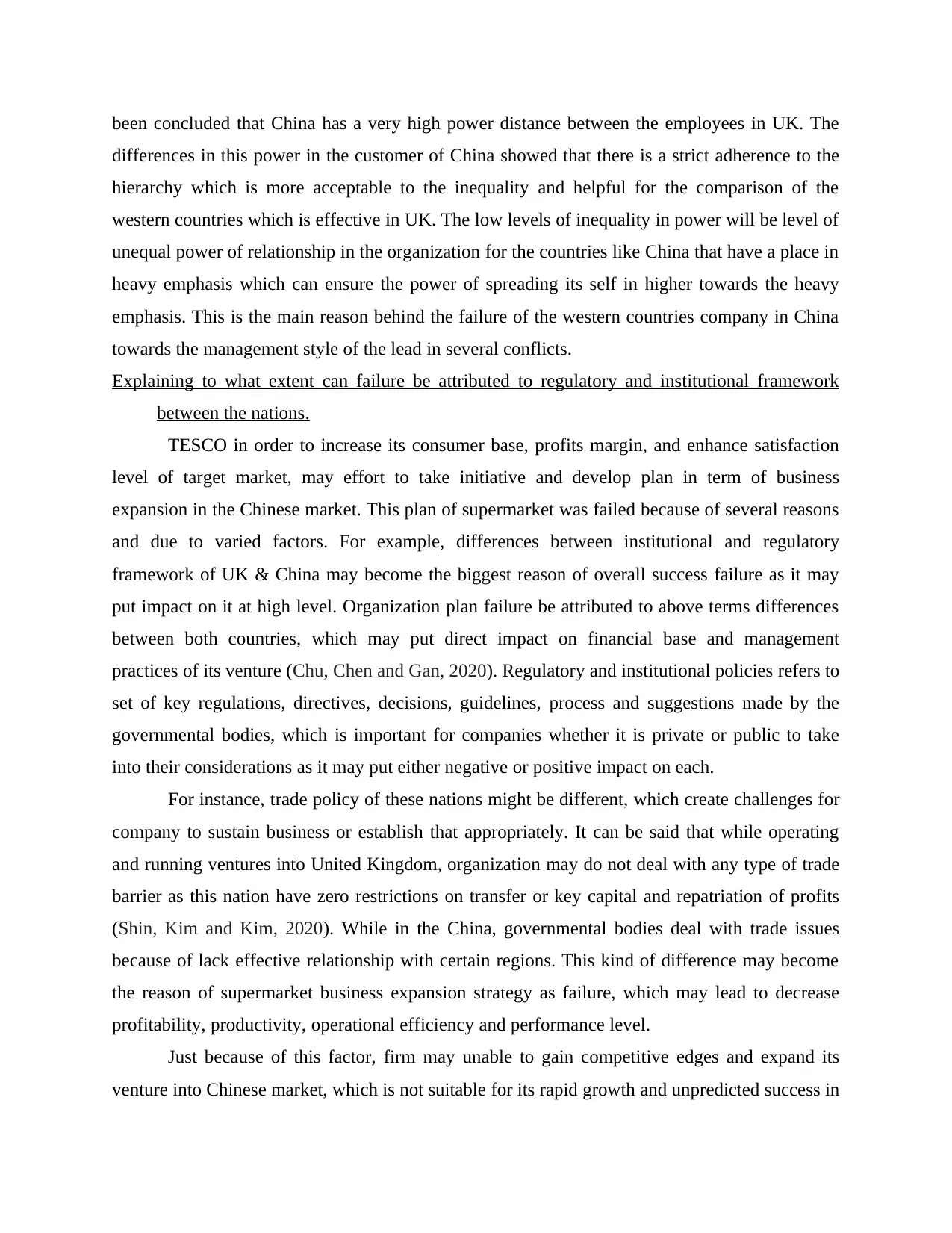
been concluded that China has a very high power distance between the employees in UK. The
differences in this power in the customer of China showed that there is a strict adherence to the
hierarchy which is more acceptable to the inequality and helpful for the comparison of the
western countries which is effective in UK. The low levels of inequality in power will be level of
unequal power of relationship in the organization for the countries like China that have a place in
heavy emphasis which can ensure the power of spreading its self in higher towards the heavy
emphasis. This is the main reason behind the failure of the western countries company in China
towards the management style of the lead in several conflicts.
Explaining to what extent can failure be attributed to regulatory and institutional framework
between the nations.
TESCO in order to increase its consumer base, profits margin, and enhance satisfaction
level of target market, may effort to take initiative and develop plan in term of business
expansion in the Chinese market. This plan of supermarket was failed because of several reasons
and due to varied factors. For example, differences between institutional and regulatory
framework of UK & China may become the biggest reason of overall success failure as it may
put impact on it at high level. Organization plan failure be attributed to above terms differences
between both countries, which may put direct impact on financial base and management
practices of its venture (Chu, Chen and Gan, 2020). Regulatory and institutional policies refers to
set of key regulations, directives, decisions, guidelines, process and suggestions made by the
governmental bodies, which is important for companies whether it is private or public to take
into their considerations as it may put either negative or positive impact on each.
For instance, trade policy of these nations might be different, which create challenges for
company to sustain business or establish that appropriately. It can be said that while operating
and running ventures into United Kingdom, organization may do not deal with any type of trade
barrier as this nation have zero restrictions on transfer or key capital and repatriation of profits
(Shin, Kim and Kim, 2020). While in the China, governmental bodies deal with trade issues
because of lack effective relationship with certain regions. This kind of difference may become
the reason of supermarket business expansion strategy as failure, which may lead to decrease
profitability, productivity, operational efficiency and performance level.
Just because of this factor, firm may unable to gain competitive edges and expand its
venture into Chinese market, which is not suitable for its rapid growth and unpredicted success in
differences in this power in the customer of China showed that there is a strict adherence to the
hierarchy which is more acceptable to the inequality and helpful for the comparison of the
western countries which is effective in UK. The low levels of inequality in power will be level of
unequal power of relationship in the organization for the countries like China that have a place in
heavy emphasis which can ensure the power of spreading its self in higher towards the heavy
emphasis. This is the main reason behind the failure of the western countries company in China
towards the management style of the lead in several conflicts.
Explaining to what extent can failure be attributed to regulatory and institutional framework
between the nations.
TESCO in order to increase its consumer base, profits margin, and enhance satisfaction
level of target market, may effort to take initiative and develop plan in term of business
expansion in the Chinese market. This plan of supermarket was failed because of several reasons
and due to varied factors. For example, differences between institutional and regulatory
framework of UK & China may become the biggest reason of overall success failure as it may
put impact on it at high level. Organization plan failure be attributed to above terms differences
between both countries, which may put direct impact on financial base and management
practices of its venture (Chu, Chen and Gan, 2020). Regulatory and institutional policies refers to
set of key regulations, directives, decisions, guidelines, process and suggestions made by the
governmental bodies, which is important for companies whether it is private or public to take
into their considerations as it may put either negative or positive impact on each.
For instance, trade policy of these nations might be different, which create challenges for
company to sustain business or establish that appropriately. It can be said that while operating
and running ventures into United Kingdom, organization may do not deal with any type of trade
barrier as this nation have zero restrictions on transfer or key capital and repatriation of profits
(Shin, Kim and Kim, 2020). While in the China, governmental bodies deal with trade issues
because of lack effective relationship with certain regions. This kind of difference may become
the reason of supermarket business expansion strategy as failure, which may lead to decrease
profitability, productivity, operational efficiency and performance level.
Just because of this factor, firm may unable to gain competitive edges and expand its
venture into Chinese market, which is not suitable for its rapid growth and unpredicted success in
⊘ This is a preview!⊘
Do you want full access?
Subscribe today to unlock all pages.

Trusted by 1+ million students worldwide
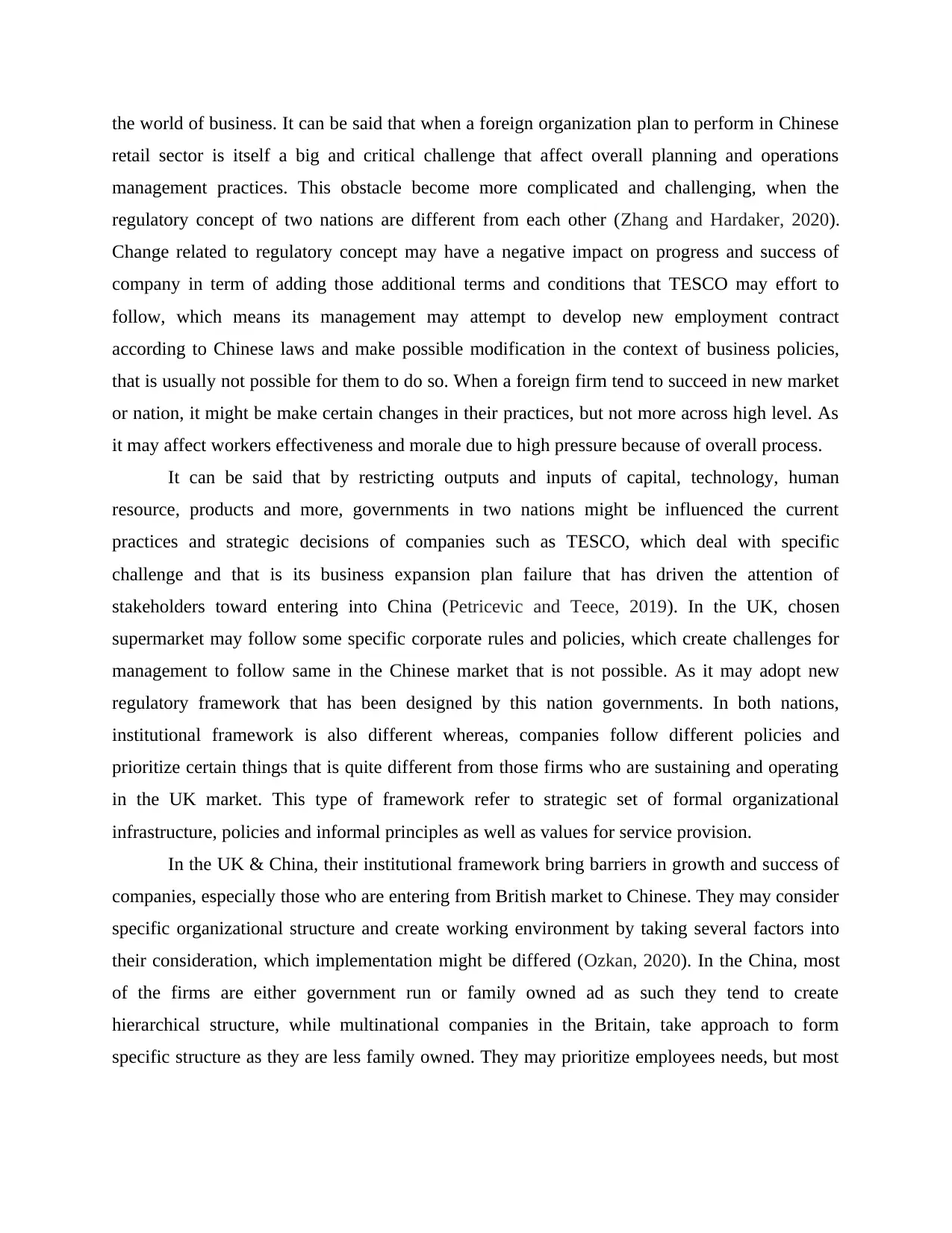
the world of business. It can be said that when a foreign organization plan to perform in Chinese
retail sector is itself a big and critical challenge that affect overall planning and operations
management practices. This obstacle become more complicated and challenging, when the
regulatory concept of two nations are different from each other (Zhang and Hardaker, 2020).
Change related to regulatory concept may have a negative impact on progress and success of
company in term of adding those additional terms and conditions that TESCO may effort to
follow, which means its management may attempt to develop new employment contract
according to Chinese laws and make possible modification in the context of business policies,
that is usually not possible for them to do so. When a foreign firm tend to succeed in new market
or nation, it might be make certain changes in their practices, but not more across high level. As
it may affect workers effectiveness and morale due to high pressure because of overall process.
It can be said that by restricting outputs and inputs of capital, technology, human
resource, products and more, governments in two nations might be influenced the current
practices and strategic decisions of companies such as TESCO, which deal with specific
challenge and that is its business expansion plan failure that has driven the attention of
stakeholders toward entering into China (Petricevic and Teece, 2019). In the UK, chosen
supermarket may follow some specific corporate rules and policies, which create challenges for
management to follow same in the Chinese market that is not possible. As it may adopt new
regulatory framework that has been designed by this nation governments. In both nations,
institutional framework is also different whereas, companies follow different policies and
prioritize certain things that is quite different from those firms who are sustaining and operating
in the UK market. This type of framework refer to strategic set of formal organizational
infrastructure, policies and informal principles as well as values for service provision.
In the UK & China, their institutional framework bring barriers in growth and success of
companies, especially those who are entering from British market to Chinese. They may consider
specific organizational structure and create working environment by taking several factors into
their consideration, which implementation might be differed (Ozkan, 2020). In the China, most
of the firms are either government run or family owned ad as such they tend to create
hierarchical structure, while multinational companies in the Britain, take approach to form
specific structure as they are less family owned. They may prioritize employees needs, but most
retail sector is itself a big and critical challenge that affect overall planning and operations
management practices. This obstacle become more complicated and challenging, when the
regulatory concept of two nations are different from each other (Zhang and Hardaker, 2020).
Change related to regulatory concept may have a negative impact on progress and success of
company in term of adding those additional terms and conditions that TESCO may effort to
follow, which means its management may attempt to develop new employment contract
according to Chinese laws and make possible modification in the context of business policies,
that is usually not possible for them to do so. When a foreign firm tend to succeed in new market
or nation, it might be make certain changes in their practices, but not more across high level. As
it may affect workers effectiveness and morale due to high pressure because of overall process.
It can be said that by restricting outputs and inputs of capital, technology, human
resource, products and more, governments in two nations might be influenced the current
practices and strategic decisions of companies such as TESCO, which deal with specific
challenge and that is its business expansion plan failure that has driven the attention of
stakeholders toward entering into China (Petricevic and Teece, 2019). In the UK, chosen
supermarket may follow some specific corporate rules and policies, which create challenges for
management to follow same in the Chinese market that is not possible. As it may adopt new
regulatory framework that has been designed by this nation governments. In both nations,
institutional framework is also different whereas, companies follow different policies and
prioritize certain things that is quite different from those firms who are sustaining and operating
in the UK market. This type of framework refer to strategic set of formal organizational
infrastructure, policies and informal principles as well as values for service provision.
In the UK & China, their institutional framework bring barriers in growth and success of
companies, especially those who are entering from British market to Chinese. They may consider
specific organizational structure and create working environment by taking several factors into
their consideration, which implementation might be differed (Ozkan, 2020). In the China, most
of the firms are either government run or family owned ad as such they tend to create
hierarchical structure, while multinational companies in the Britain, take approach to form
specific structure as they are less family owned. They may prioritize employees needs, but most
Paraphrase This Document
Need a fresh take? Get an instant paraphrase of this document with our AI Paraphraser
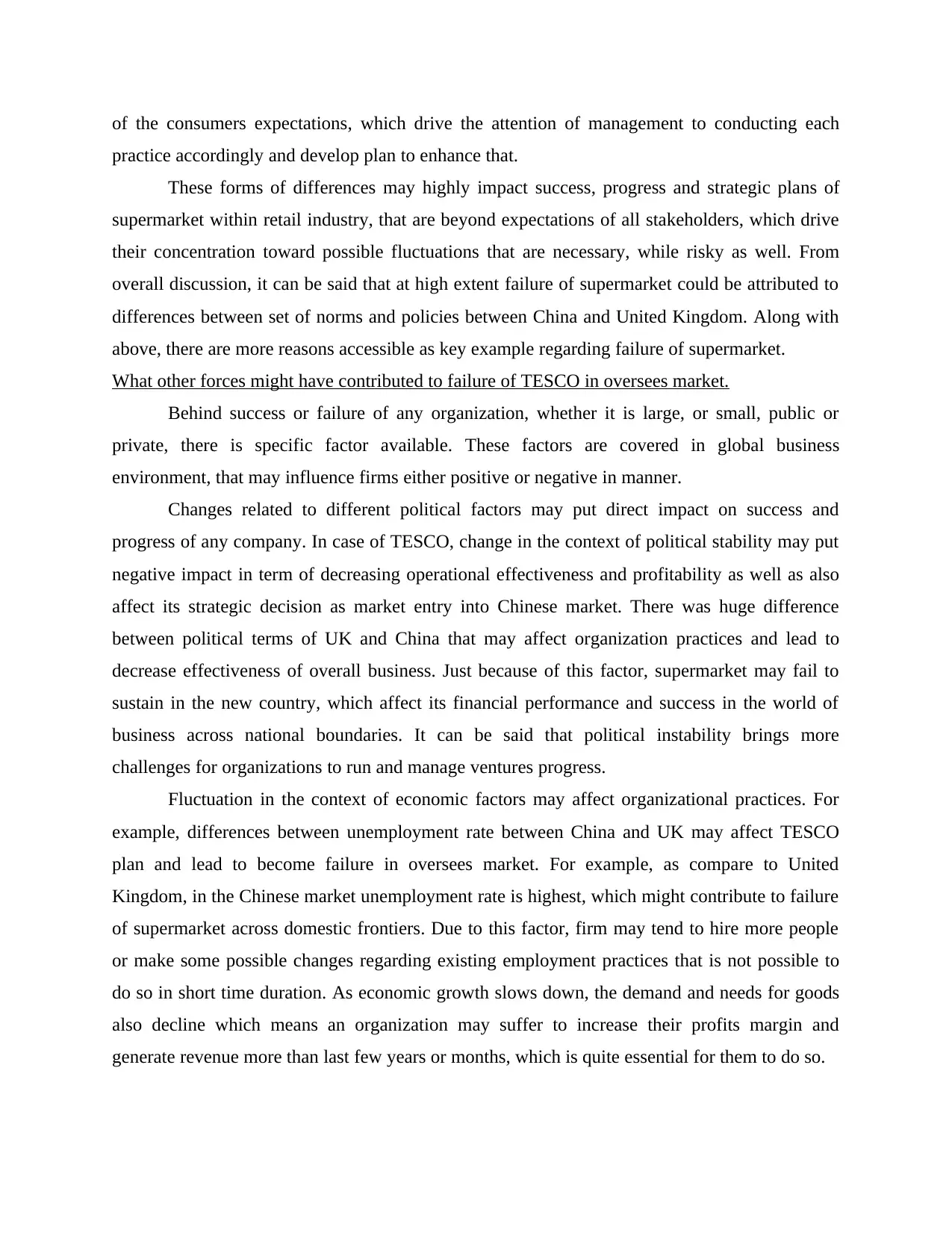
of the consumers expectations, which drive the attention of management to conducting each
practice accordingly and develop plan to enhance that.
These forms of differences may highly impact success, progress and strategic plans of
supermarket within retail industry, that are beyond expectations of all stakeholders, which drive
their concentration toward possible fluctuations that are necessary, while risky as well. From
overall discussion, it can be said that at high extent failure of supermarket could be attributed to
differences between set of norms and policies between China and United Kingdom. Along with
above, there are more reasons accessible as key example regarding failure of supermarket.
What other forces might have contributed to failure of TESCO in oversees market.
Behind success or failure of any organization, whether it is large, or small, public or
private, there is specific factor available. These factors are covered in global business
environment, that may influence firms either positive or negative in manner.
Changes related to different political factors may put direct impact on success and
progress of any company. In case of TESCO, change in the context of political stability may put
negative impact in term of decreasing operational effectiveness and profitability as well as also
affect its strategic decision as market entry into Chinese market. There was huge difference
between political terms of UK and China that may affect organization practices and lead to
decrease effectiveness of overall business. Just because of this factor, supermarket may fail to
sustain in the new country, which affect its financial performance and success in the world of
business across national boundaries. It can be said that political instability brings more
challenges for organizations to run and manage ventures progress.
Fluctuation in the context of economic factors may affect organizational practices. For
example, differences between unemployment rate between China and UK may affect TESCO
plan and lead to become failure in oversees market. For example, as compare to United
Kingdom, in the Chinese market unemployment rate is highest, which might contribute to failure
of supermarket across domestic frontiers. Due to this factor, firm may tend to hire more people
or make some possible changes regarding existing employment practices that is not possible to
do so in short time duration. As economic growth slows down, the demand and needs for goods
also decline which means an organization may suffer to increase their profits margin and
generate revenue more than last few years or months, which is quite essential for them to do so.
practice accordingly and develop plan to enhance that.
These forms of differences may highly impact success, progress and strategic plans of
supermarket within retail industry, that are beyond expectations of all stakeholders, which drive
their concentration toward possible fluctuations that are necessary, while risky as well. From
overall discussion, it can be said that at high extent failure of supermarket could be attributed to
differences between set of norms and policies between China and United Kingdom. Along with
above, there are more reasons accessible as key example regarding failure of supermarket.
What other forces might have contributed to failure of TESCO in oversees market.
Behind success or failure of any organization, whether it is large, or small, public or
private, there is specific factor available. These factors are covered in global business
environment, that may influence firms either positive or negative in manner.
Changes related to different political factors may put direct impact on success and
progress of any company. In case of TESCO, change in the context of political stability may put
negative impact in term of decreasing operational effectiveness and profitability as well as also
affect its strategic decision as market entry into Chinese market. There was huge difference
between political terms of UK and China that may affect organization practices and lead to
decrease effectiveness of overall business. Just because of this factor, supermarket may fail to
sustain in the new country, which affect its financial performance and success in the world of
business across national boundaries. It can be said that political instability brings more
challenges for organizations to run and manage ventures progress.
Fluctuation in the context of economic factors may affect organizational practices. For
example, differences between unemployment rate between China and UK may affect TESCO
plan and lead to become failure in oversees market. For example, as compare to United
Kingdom, in the Chinese market unemployment rate is highest, which might contribute to failure
of supermarket across domestic frontiers. Due to this factor, firm may tend to hire more people
or make some possible changes regarding existing employment practices that is not possible to
do so in short time duration. As economic growth slows down, the demand and needs for goods
also decline which means an organization may suffer to increase their profits margin and
generate revenue more than last few years or months, which is quite essential for them to do so.
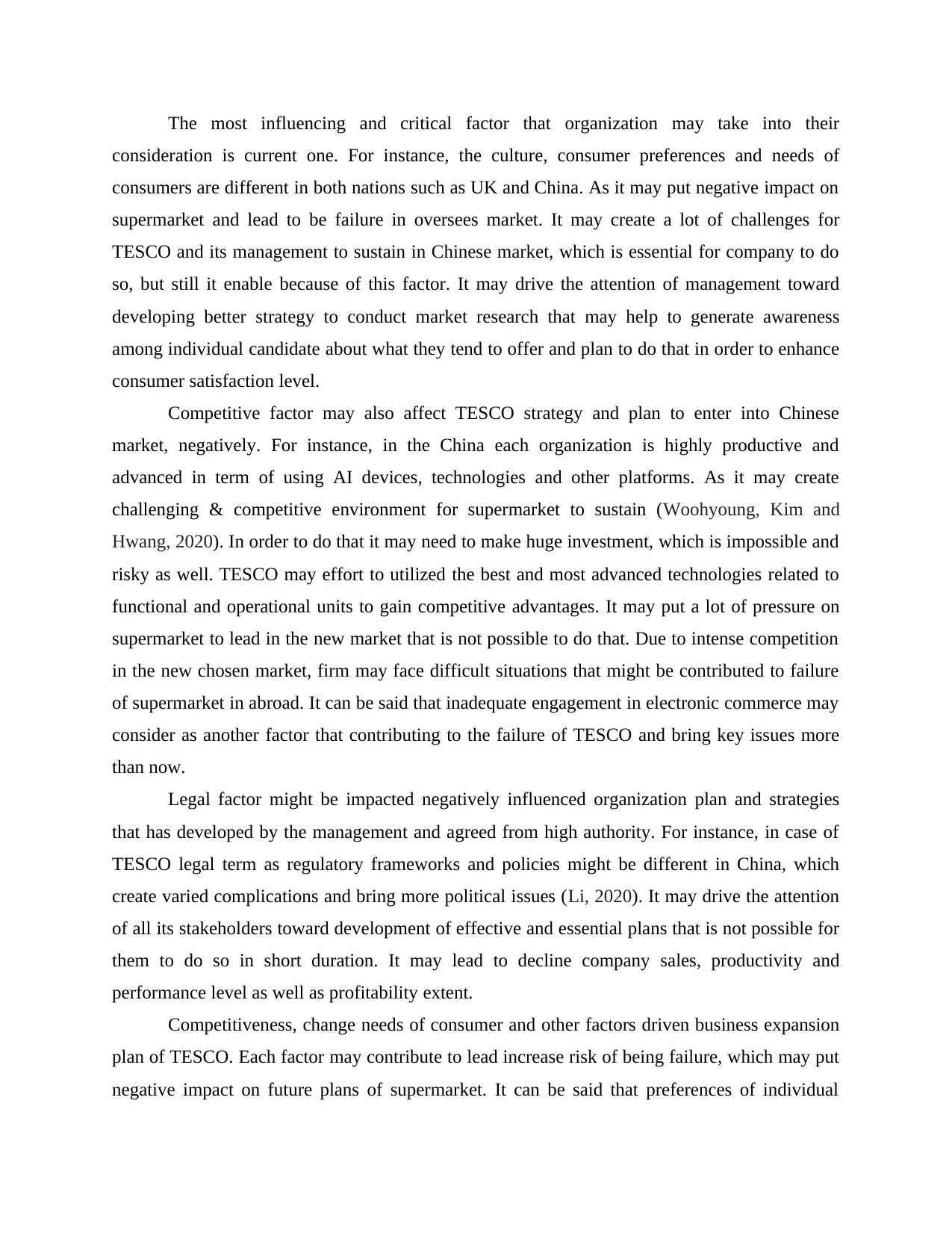
The most influencing and critical factor that organization may take into their
consideration is current one. For instance, the culture, consumer preferences and needs of
consumers are different in both nations such as UK and China. As it may put negative impact on
supermarket and lead to be failure in oversees market. It may create a lot of challenges for
TESCO and its management to sustain in Chinese market, which is essential for company to do
so, but still it enable because of this factor. It may drive the attention of management toward
developing better strategy to conduct market research that may help to generate awareness
among individual candidate about what they tend to offer and plan to do that in order to enhance
consumer satisfaction level.
Competitive factor may also affect TESCO strategy and plan to enter into Chinese
market, negatively. For instance, in the China each organization is highly productive and
advanced in term of using AI devices, technologies and other platforms. As it may create
challenging & competitive environment for supermarket to sustain (Woohyoung, Kim and
Hwang, 2020). In order to do that it may need to make huge investment, which is impossible and
risky as well. TESCO may effort to utilized the best and most advanced technologies related to
functional and operational units to gain competitive advantages. It may put a lot of pressure on
supermarket to lead in the new market that is not possible to do that. Due to intense competition
in the new chosen market, firm may face difficult situations that might be contributed to failure
of supermarket in abroad. It can be said that inadequate engagement in electronic commerce may
consider as another factor that contributing to the failure of TESCO and bring key issues more
than now.
Legal factor might be impacted negatively influenced organization plan and strategies
that has developed by the management and agreed from high authority. For instance, in case of
TESCO legal term as regulatory frameworks and policies might be different in China, which
create varied complications and bring more political issues (Li, 2020). It may drive the attention
of all its stakeholders toward development of effective and essential plans that is not possible for
them to do so in short duration. It may lead to decline company sales, productivity and
performance level as well as profitability extent.
Competitiveness, change needs of consumer and other factors driven business expansion
plan of TESCO. Each factor may contribute to lead increase risk of being failure, which may put
negative impact on future plans of supermarket. It can be said that preferences of individual
consideration is current one. For instance, the culture, consumer preferences and needs of
consumers are different in both nations such as UK and China. As it may put negative impact on
supermarket and lead to be failure in oversees market. It may create a lot of challenges for
TESCO and its management to sustain in Chinese market, which is essential for company to do
so, but still it enable because of this factor. It may drive the attention of management toward
developing better strategy to conduct market research that may help to generate awareness
among individual candidate about what they tend to offer and plan to do that in order to enhance
consumer satisfaction level.
Competitive factor may also affect TESCO strategy and plan to enter into Chinese
market, negatively. For instance, in the China each organization is highly productive and
advanced in term of using AI devices, technologies and other platforms. As it may create
challenging & competitive environment for supermarket to sustain (Woohyoung, Kim and
Hwang, 2020). In order to do that it may need to make huge investment, which is impossible and
risky as well. TESCO may effort to utilized the best and most advanced technologies related to
functional and operational units to gain competitive advantages. It may put a lot of pressure on
supermarket to lead in the new market that is not possible to do that. Due to intense competition
in the new chosen market, firm may face difficult situations that might be contributed to failure
of supermarket in abroad. It can be said that inadequate engagement in electronic commerce may
consider as another factor that contributing to the failure of TESCO and bring key issues more
than now.
Legal factor might be impacted negatively influenced organization plan and strategies
that has developed by the management and agreed from high authority. For instance, in case of
TESCO legal term as regulatory frameworks and policies might be different in China, which
create varied complications and bring more political issues (Li, 2020). It may drive the attention
of all its stakeholders toward development of effective and essential plans that is not possible for
them to do so in short duration. It may lead to decline company sales, productivity and
performance level as well as profitability extent.
Competitiveness, change needs of consumer and other factors driven business expansion
plan of TESCO. Each factor may contribute to lead increase risk of being failure, which may put
negative impact on future plans of supermarket. It can be said that preferences of individual
⊘ This is a preview!⊘
Do you want full access?
Subscribe today to unlock all pages.

Trusted by 1+ million students worldwide
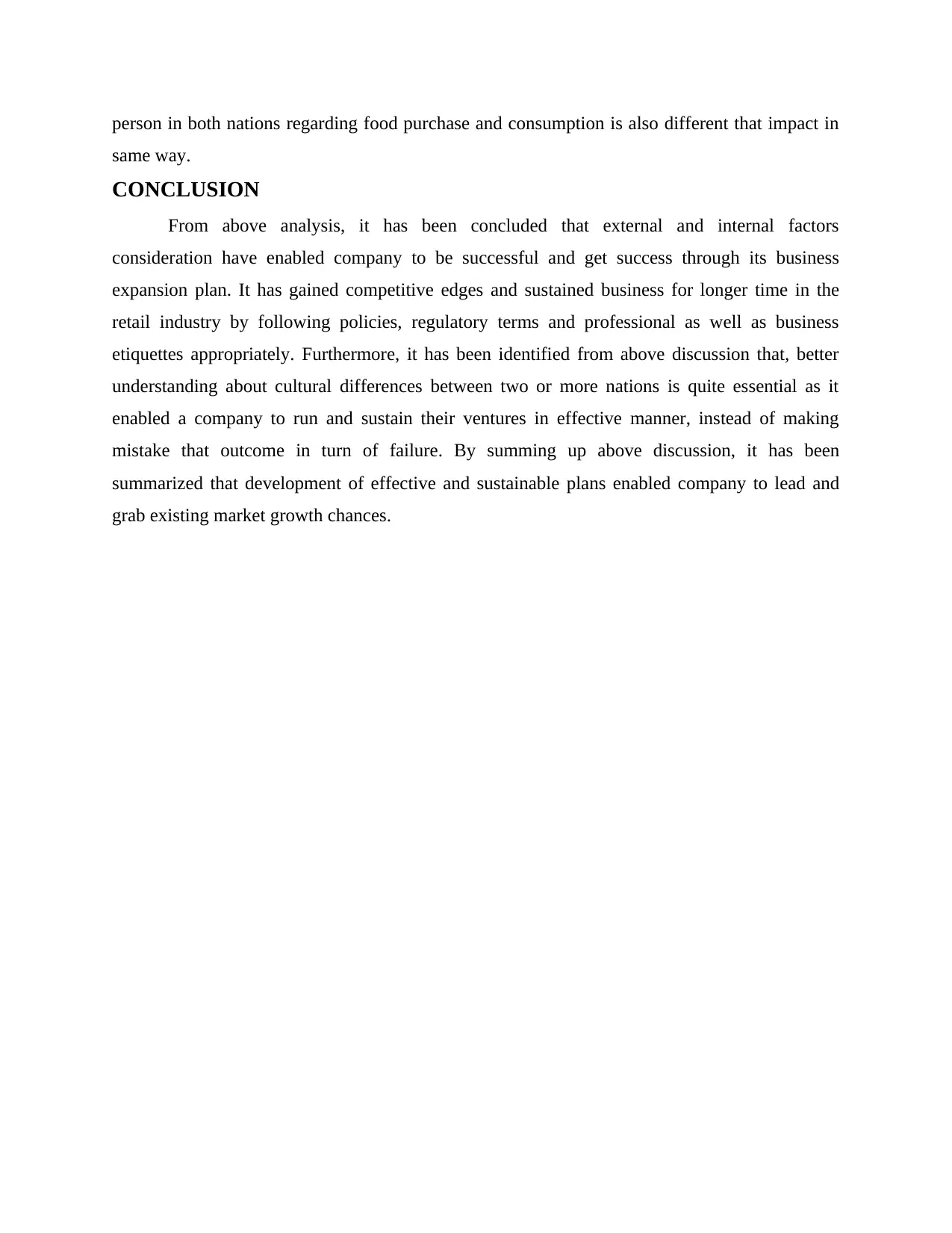
person in both nations regarding food purchase and consumption is also different that impact in
same way.
CONCLUSION
From above analysis, it has been concluded that external and internal factors
consideration have enabled company to be successful and get success through its business
expansion plan. It has gained competitive edges and sustained business for longer time in the
retail industry by following policies, regulatory terms and professional as well as business
etiquettes appropriately. Furthermore, it has been identified from above discussion that, better
understanding about cultural differences between two or more nations is quite essential as it
enabled a company to run and sustain their ventures in effective manner, instead of making
mistake that outcome in turn of failure. By summing up above discussion, it has been
summarized that development of effective and sustainable plans enabled company to lead and
grab existing market growth chances.
same way.
CONCLUSION
From above analysis, it has been concluded that external and internal factors
consideration have enabled company to be successful and get success through its business
expansion plan. It has gained competitive edges and sustained business for longer time in the
retail industry by following policies, regulatory terms and professional as well as business
etiquettes appropriately. Furthermore, it has been identified from above discussion that, better
understanding about cultural differences between two or more nations is quite essential as it
enabled a company to run and sustain their ventures in effective manner, instead of making
mistake that outcome in turn of failure. By summing up above discussion, it has been
summarized that development of effective and sustainable plans enabled company to lead and
grab existing market growth chances.
Paraphrase This Document
Need a fresh take? Get an instant paraphrase of this document with our AI Paraphraser
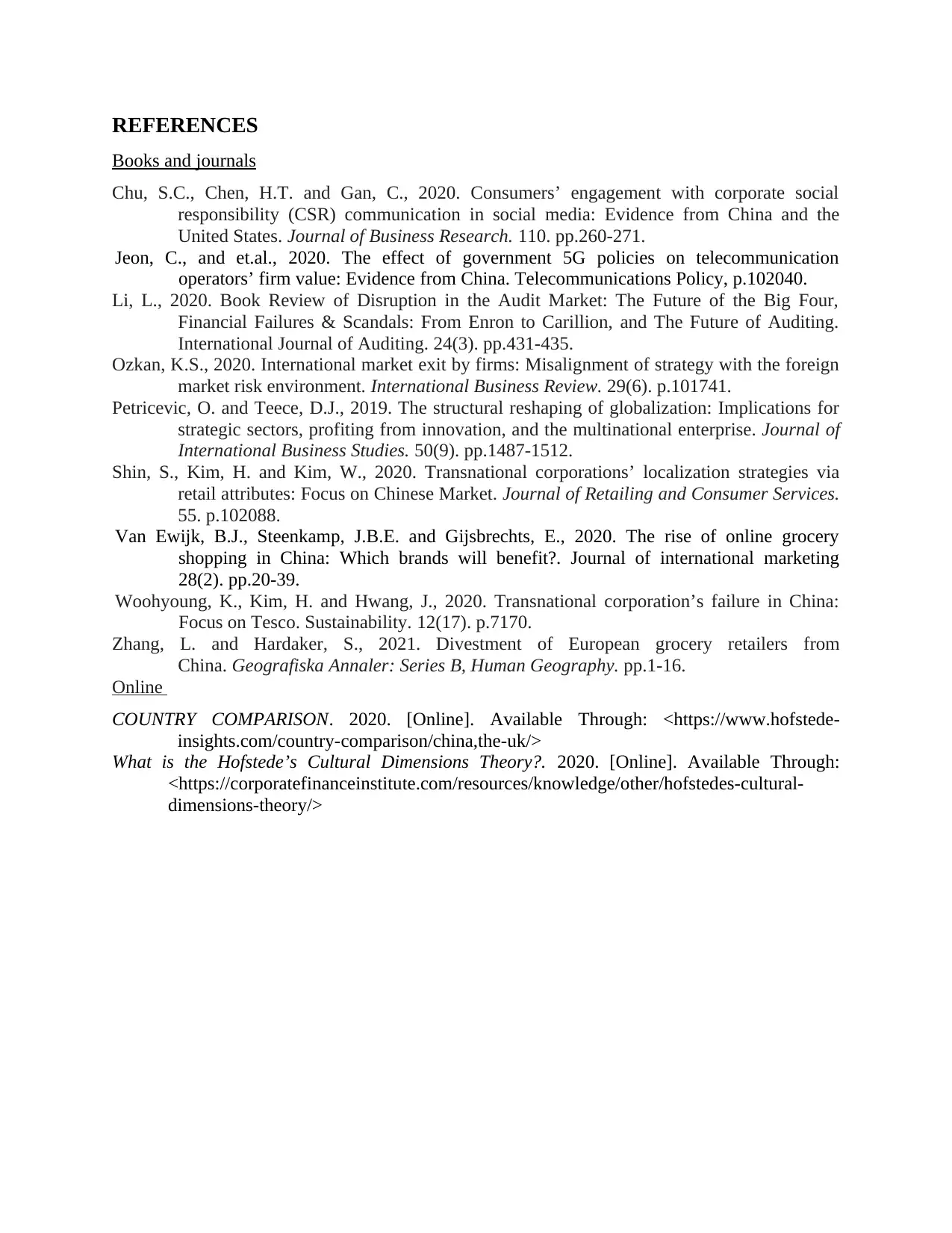
REFERENCES
Books and journals
Chu, S.C., Chen, H.T. and Gan, C., 2020. Consumers’ engagement with corporate social
responsibility (CSR) communication in social media: Evidence from China and the
United States. Journal of Business Research. 110. pp.260-271.
Jeon, C., and et.al., 2020. The effect of government 5G policies on telecommunication
operators’ firm value: Evidence from China. Telecommunications Policy, p.102040.
Li, L., 2020. Book Review of Disruption in the Audit Market: The Future of the Big Four,
Financial Failures & Scandals: From Enron to Carillion, and The Future of Auditing.
International Journal of Auditing. 24(3). pp.431-435.
Ozkan, K.S., 2020. International market exit by firms: Misalignment of strategy with the foreign
market risk environment. International Business Review. 29(6). p.101741.
Petricevic, O. and Teece, D.J., 2019. The structural reshaping of globalization: Implications for
strategic sectors, profiting from innovation, and the multinational enterprise. Journal of
International Business Studies. 50(9). pp.1487-1512.
Shin, S., Kim, H. and Kim, W., 2020. Transnational corporations’ localization strategies via
retail attributes: Focus on Chinese Market. Journal of Retailing and Consumer Services.
55. p.102088.
Van Ewijk, B.J., Steenkamp, J.B.E. and Gijsbrechts, E., 2020. The rise of online grocery
shopping in China: Which brands will benefit?. Journal of international marketing
28(2). pp.20-39.
Woohyoung, K., Kim, H. and Hwang, J., 2020. Transnational corporation’s failure in China:
Focus on Tesco. Sustainability. 12(17). p.7170.
Zhang, L. and Hardaker, S., 2021. Divestment of European grocery retailers from
China. Geografiska Annaler: Series B, Human Geography. pp.1-16.
Online
COUNTRY COMPARISON. 2020. [Online]. Available Through: <https://www.hofstede-
insights.com/country-comparison/china,the-uk/>
What is the Hofstede’s Cultural Dimensions Theory?. 2020. [Online]. Available Through:
<https://corporatefinanceinstitute.com/resources/knowledge/other/hofstedes-cultural-
dimensions-theory/>
Books and journals
Chu, S.C., Chen, H.T. and Gan, C., 2020. Consumers’ engagement with corporate social
responsibility (CSR) communication in social media: Evidence from China and the
United States. Journal of Business Research. 110. pp.260-271.
Jeon, C., and et.al., 2020. The effect of government 5G policies on telecommunication
operators’ firm value: Evidence from China. Telecommunications Policy, p.102040.
Li, L., 2020. Book Review of Disruption in the Audit Market: The Future of the Big Four,
Financial Failures & Scandals: From Enron to Carillion, and The Future of Auditing.
International Journal of Auditing. 24(3). pp.431-435.
Ozkan, K.S., 2020. International market exit by firms: Misalignment of strategy with the foreign
market risk environment. International Business Review. 29(6). p.101741.
Petricevic, O. and Teece, D.J., 2019. The structural reshaping of globalization: Implications for
strategic sectors, profiting from innovation, and the multinational enterprise. Journal of
International Business Studies. 50(9). pp.1487-1512.
Shin, S., Kim, H. and Kim, W., 2020. Transnational corporations’ localization strategies via
retail attributes: Focus on Chinese Market. Journal of Retailing and Consumer Services.
55. p.102088.
Van Ewijk, B.J., Steenkamp, J.B.E. and Gijsbrechts, E., 2020. The rise of online grocery
shopping in China: Which brands will benefit?. Journal of international marketing
28(2). pp.20-39.
Woohyoung, K., Kim, H. and Hwang, J., 2020. Transnational corporation’s failure in China:
Focus on Tesco. Sustainability. 12(17). p.7170.
Zhang, L. and Hardaker, S., 2021. Divestment of European grocery retailers from
China. Geografiska Annaler: Series B, Human Geography. pp.1-16.
Online
COUNTRY COMPARISON. 2020. [Online]. Available Through: <https://www.hofstede-
insights.com/country-comparison/china,the-uk/>
What is the Hofstede’s Cultural Dimensions Theory?. 2020. [Online]. Available Through:
<https://corporatefinanceinstitute.com/resources/knowledge/other/hofstedes-cultural-
dimensions-theory/>

1
⊘ This is a preview!⊘
Do you want full access?
Subscribe today to unlock all pages.

Trusted by 1+ million students worldwide
1 out of 12
Related Documents
Your All-in-One AI-Powered Toolkit for Academic Success.
+13062052269
info@desklib.com
Available 24*7 on WhatsApp / Email
![[object Object]](/_next/static/media/star-bottom.7253800d.svg)
Unlock your academic potential
Copyright © 2020–2026 A2Z Services. All Rights Reserved. Developed and managed by ZUCOL.




